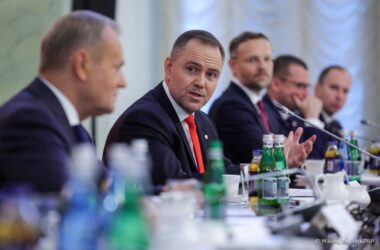On October 18, former Polish president Aleksander Kwaśniewski warned of Russian‑instigated fake news during a lecture at Lublin Catholic University.
Lecture at Lublin Catholic University
On Saturday, 18 October, Aleksander Kwaśniewski delivered the lecture “Świat wobec nowych wyzwań” (The World Facing New Challenges) at the Katolicki Uniwersytet Lubelski. He opened with a reminder that the university has always been a place of dialogue and openness, where various questions and values are debated.
During the talk, the former president addressed the problem of fake news and online provocations such as identity impersonation, admitting he had once fallen victim to a Russian‑led campaign.
Russian Provocation Targeting Kwaśniewski
He recounted that his office received a call from men pretending to be staff of former Ukrainian president Petro Poroshenko, claiming to want a Zoom meeting. Kwaśniewski agreed to the call, whettering, “I opened the screen and saw Poroshenko in a field uniform.” He spoke briefly in English and Russian, then switched to Russian to “talk in the aggressor’s language.”
In reality, the caller was not Poroshenko. Kwaśniewski emphasized that no statements or opinions required a public apology, noting that his views were “publicly known and unchanged.” He compared the incident to a later one involving Deputy Prime Minister Radosław Sikorski and warned, “If I can be fooled like that, what about voters?”
Kwaśniewski’s Call to Journalists and Politicians
The former president used his platform to illustrate how easily people can be deceived, saying, “You can make people think you’re destroying someone you want to destroy.” He warned that a fallacious figure could speak beautifully and seem trustworthy.
He appealed to journalists, politicians and legislators to collectively devise effective measures against fake news and online provocations.
Nationwide Anti‑Disinformation Campaign
This week, the Ministry of Digital Affairs, in cooperation with NASK, launched a nationwide social campaign aimed at combating disinformation. The campaign’s objective is to strengthen public awareness of responsible information use, source verification, and responses to unverified content.










